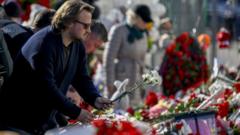1 hour ago
About sharing
It began with hints. Intimation.
Now, it’s no holds barred accusations.
The Russian authorities are aggressively pushing the line that Ukraine and the West were behind last month’s Crocus City concert hall massacre outside Moscow which left 145 people dead.
The Islamic State group quickly claimed responsibility for the attack. But soon after the suspected gunmen were detained President Vladimir Putin hinted at a Ukrainian connection.
At the weekend Russian state TV broadcast interrogation videos of the four suspects, all citizens of Tajikistan. One of the men said on camera that the post-attack plan had been “to head towards Kyiv”.
Their words must be taken with extreme caution. During a court appearance after their arrest the men showed signs of torture.
The Russian TV correspondent presenting the report went on to make a series of strange claims:
“Following the terrorist attack Western sources and many Russian ‘foreign agents’ began to shift the focus from the Ukrainian connection to, exclusively, Islamic State.”
In Russia many Kremlin critics have been designated “foreign agents” for allegedly receiving funding from abroad or just being deemed “under foreign influence”.
The “shift of focus” to the IS was hardly surprising.
Not only had the group announced that it was behind the attack, it had released video of the shooting.
By contrast, Ukraine had denied any involvement. What’s more, both America and, reportedly, Iran had warned Moscow of possible attacks on Russian soil.
In its 13-minute report, Russian state TV made no mention of the IS claim of responsibility.
Then, from the journalist, this baseless accusation – that Western media “had more sympathy for those who carried out the terrorist attack which killed more than 140 defenceless people, than for the victims…”
It was a clear attempt to demonise the West in the eyes of the Russian public.
It’s not just Russian TV saying this. So is the Russian foreign ministry. In a statement on its Telegram channel, the ministry claimed that in the West “there is a strict order not to report in the media the true scale of the tragedy – not to mention the number of victims of the terrorist attack, the dead children…
“Demonstrations of humanity and sympathy for the Russian people are not allowed.”
This is pure parallel reality. The BBC has received no such order. International media organisations widely reported the devastating consequences of the mass shooting and fire at Crocus City.
As for sympathy, many Western diplomats visited the Russian foreign ministry to sign a book of condolence and, later, laid flowers for the victims outside Crocus City.
That hasn’t stopped Russian officials from lining up to blame Ukraine and the West.
Alexander Bortnikov, head of the FSB security service, told Russian TV:
“We believe that the action was prepared by both the Islamist radicals themselves and was facilitated by Western special services. The special services of Ukraine are directly related to this.”
Last week President Putin claimed that “Russia cannot be the target of terrorist attacks by Islamic fundamentalists. We are a country that demonstrates a unique example of interfaith harmony and inter-religious and inter-ethnic unity”.
Yet only last month the FSB reported it had thwarted an IS plot to attack a Moscow synagogue.
So why is the Russian leadership seemingly determined to frame Ukraine and the West for the huge loss of life at Crocus City?
Here are some possible reasons:
Don’t change enemies
Since the Kremlin’s full-scale invasion of its neighbour, Russians have been led to believe that their principal adversaries are Ukraine and the “collective West”.
It’s a message the authorities here are unwilling to alter. After all, if the Russian public were to conclude that radical Islam is a greater threat to their security than the Ukrainian government or Western leaders, they may wonder why Moscow hasn’t focused on that particular threat and has chosen, instead, to fight Ukraine.
Divert attention
Last month President Putin publicly dismissed a US embassy warning that an attack by extremists here was “imminent”.
He called the terror alert “outright blackmail…[with] the intention of intimidating and destabilising our society”. The Crocus City concert hall attack followed days later.
US officials subsequently made it clear that the intelligence they had shared with the Russian authorities had been “specific, timely, and credible”. Blaming Kyiv and the West may be an attempt to distract attention from the question of what information was passed on and how the Russian authorities acted upon it.
Escalation pretext
Asserting that Kyiv and the West were connected to the attack gives Moscow a pretext for any future escalation in the war in Ukraine – if it decides it needs it.
But some commentators are warning the Russian authorities that, for a political system, identifying the wrong enemy can prove a fatal mistake.
“That’s the way this type of system usually dies,” believes political scientist Vladimir Pastukhov, honorary senior research associate at University College London.
“They concentrate on someone they see as the main enemy and miss the real one somewhere else. For now [the authorities] will concentrate on Ukraine, on the West, on liberals. And they will open the back door. It’s through the back door that the real danger will come.”
25 March
23 March
